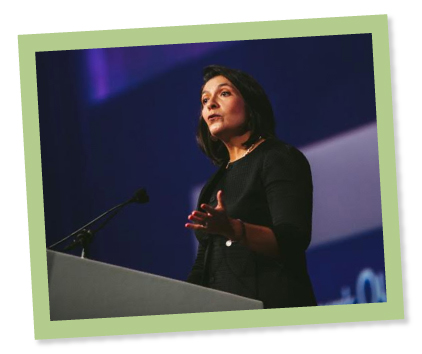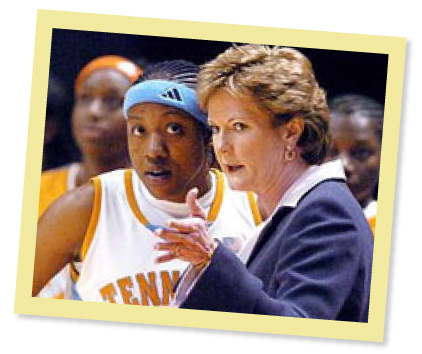 |
| Maria C. Carrillo, PhD, Alzheimer's Association chief science officer, addresses the AAIC audience. |
|
Dear Family and Friends,
As you've likely seen in the news and on social media the past few days, the Alzheimer's Association International Conference® 2016 (AAIC®) concluded last week in Toronto.
And what an exciting conference this has been!
Each year, the Alzheimer's Association gathers thousands of international investigators, clinicians and care providers to share their results, theories and discoveries. This year, more than 5,000 members of the dementia science community — from over 70 countries — convened in Toronto to share their findings and collaborate on new ideas: Truly the global vanguard of the fight against this terrible disease.
As I pore over the studies presented at AAIC 2016, I'm inspired by the innovative and effective studies taking place to improve current methods of early detection, prevention, treatment and caregiving.
The discoveries revealed at this conference show how together, we catalyze urgently needed understanding of and advances against Alzheimer's and other dementias. Thank you so much for your continued investment in all the care, support and research efforts we champion through The Judy Fund!
Here are just a few of the highlights of the research presented at AAIC 2016 by those working on the front lines of the field:
- At a special symposium, three research teams discussed emerging findings in the study of Gender and Alzheimer's Disease, including the role estrogen loss may play in cognitive decline and factors of risk and resilience to cognitive impairment in men and women. LEARN MORE
- People whose work requires complex thinking and/or activities ― particularly working with people, rather than data or physical things ― may be better able to withstand the onset of Alzheimer's — more proof of how "cognitive reserve" may protect the brain from disease. LEARN MORE
- Smell and eye tests could provide simple, early, low-cost tool(s) for detection of memory decline and dementia. Using newly-validated biomarkers to create tests that are non-invasive and less expensive than current methods (such as PET scans) could lead to dramatic improvements in early detection and treatment of the disease. LEARN MORE
- Novel research from Canadian scientists on the shared and separate causes of, markers for, and progression of Parkinson's and Alzheimer's could help identify new ways to treat the diseases. LEARN MORE
- An innovative program in Australia has reduced the use of antipsychotic drugs in dementia treatment in long-term care settings; in the United States, one-quarter of dementia patients are inappropriately treated with drugs that cause sedation. LEARN MORE
- A new American study suggests that treating people with Alzheimer's disease may increase survival and incur less overall cost of care than non-treatment. LEARN MORE
|
|
|
|
 |
| We mourn the loss of our friend and fellow Shriver award recipient, Pat Summitt. |
|
Another amazing woman lost too soon
In memory of Judy Gelfand and other women who have faced this disease with strength and dignity, The Judy Fund notes with special sadness the recent passing of University of Tennessee Lady Volunteers coach Pat Summitt at the age of 64.
Already a trailblazer, becoming the winningest Division-1 coach in NCAA history, Coach Summitt led the way by bravely disclosing her younger-onset Alzheimer's diagnosis in May of 2011. "The Alzheimer's Association extends sincere condolences to Pat Summitt's son Tyler, extended family, many friends and countless fans. Coach Summitt faced Alzheimer's disease, as only she could, strongly and publicly. One of the greatest coaches in the history of sports continued to be an educator and coach off the court, educating so many about Alzheimer's disease and rallying people to take action and become involved in the Alzheimer's cause," said Harry Johns, president and CEO of the Alzheimer's Association. "Coach Summitt was a courageous advocate for this cause. In honor of her struggle and the challenges faced by millions of Americans, we will continue to aggressively pursue greater awareness, support for families and research that will slow, stop and ultimately cure Alzheimer's disease."
In an interview with USA Today Sports, Beth Kallmyer, vice president of constituent services for the Alzheimer's Association, said, "When we look at public figures, there are very few that have come out publicly and said, 'I have Alzheimer's' and then continued to remain public for a period of time. The impact of that is significant."
Pat's passing has special meaning for me, not only because Pat and her son Tyler received the Sargent and Eunice Shriver Profiles in Dignity Award from the Alzheimer's Association in 2012, the same award that my father, Marshall, and I were so honored to receive in 2014.
My dear friend Greg O'Brien, a member of the Association's Early-Stage Advisory Group, said it best when he wrote, in tribute to Pat in Time magazine, "It's been said that in 25 years there will be two kinds of people — those with Alzheimer's and those caring for someone with Alzheimer's. Pat Summitt did not want, nor do I want, your pity. Please understand this could be your story some day. Until we understand collectively that Alzheimer's strikes people in the prime of life — individuals at first glance who seem just like you — there will be no critical mass to demand a cure for this disease that is poised to annihilate the Baby Boomer generation and generations to come."
Let us honor the courage and impact of women like Pat Summitt with renewed dedication to the fight against this disease.
|
|
|
|
Thank you to all who donate to The Judy Fund and a special thank you to those who participated in our Mother's Day matching gift challenge, to support efforts such as the Women's Alzheimer's Research Initiative (WARI), which illuminates gender differences in Alzheimer's and dementia. I was so pleased to see the support of both longtime and new donors in response to this challenge!
Almost two-thirds of Americans with Alzheimer's disease are women — our mothers and grandmothers, our aunts, sisters, and dearest friends. That's why the Gelfand family has committed $100,000 to this groundbreaking research initiative focused on gender differences in Alzheimer's — biological, genetic, epidemiological and social. Please take advantage of this important opportunity to join us by making a gift to The Judy Fund today.
I'm grateful for the role each of you plays as an investor, stakeholder and friend in the global movement to end Alzheimer's disease. The work of The Judy Fund — and the care, support and research advances we fuel — simply would not be possible without you.
Savor these last days of summer with the people you love.
Thank you!
Sincerely,
 Elizabeth Gelfand Stearns
Elizabeth Gelfand Stearns
Chair, The Judy Fund
|
|
|
|
| |
The Alzheimer's Association is the leading voluntary health organization in Alzheimer's care, support and research. Our mission is to eliminate Alzheimer's disease through the advancement of research; to provide and enhance care and support for all affected; and to reduce the risk of dementia through the promotion of brain health. Our vision is a world without Alzheimer's disease®.
|
Alzheimer's Association National Office, 225 N. Michigan Ave., Fl. 17, Chicago, IL 60601
© 2016 Alzheimer's Association. All rights reserved.
800.272.3900 | alz.org® | Donate
View your email preferences or unsubscribe.
|
| |
|
|
|
| |